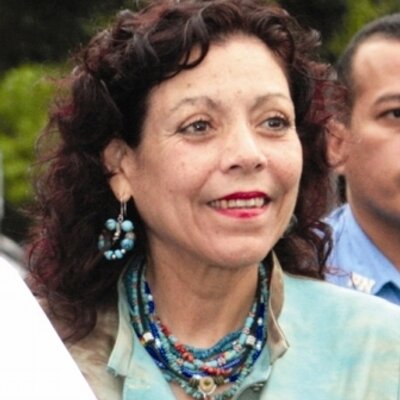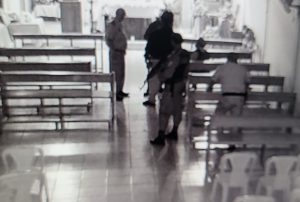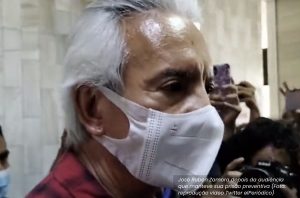La Prensa, the oldest and most belligerent media outlet in Nicaragua and the target of relentless persecution by the Daniel Ortega regime, has reacted to the confiscation of its assets and facilities announced by the United States two days ago and its intention to turn them into a cultural centre. First Lady and the country’s vice president, Rosario Murillo.
In a statement titled “They’re in the past,” published Wednesday 25th, the newspaper management says it will fight to reverse the confiscation, but even without headquarters and assets, “it will continue to do journalism as long as there are Nicaraguans.” who read it?
In an interview with Argentine website Infobae, 95-year-old Ana Chamorro de Holman, daughter of the paper’s founder, said she was “angry” and hoped that soon the newspapers would use the machines again and employees would “return to the building”. stolen”.
Press in Ortega and Nicaragua
Daniel Ortega’s government is using all weapons to destroy the country’s independent press. The main destination is La Prensa.
Founded in 1926, the vehicle was occupied by the Ortega government in August 2021, but continued to work with journalists and exiles in Nicaragua.
In addition to the occupation of the US$10 million building, the confiscation of printing equipment, and the threats and arrests of employees, three heirs to the newspaper’s founder were also arrested – Cristiana Chamorro Barrios, Pedro Joaquín Chamorro Barrios and Juan Lorenzo Holmann Çamorro.
And Carlos Fernando Chamorro, Cristiana’s brother and editor of the Confidencial website, fled the country after occupying his home to “protect his freedom.” He is one of the most important journalists in Nicaragua.
In July, the harassment intensified. Two drivers of the press car were arrested in response to a report about Ortega’s deportation of the nuns. The newspaper announced that all of its employees were transferred abroad.
The newsroom now works in Costa Rica for an online-only version.
In the note expressing its willingness to continue to challenge the persecution, the Editorial Board said:
There has never been a dictatorship that has brutalized the values La Prensa represents like the dictatorship of Daniel Ortega and Rosario Murillo.”
The newspaper reminds that it is not the first time that it has faced difficulties, as it has lived with three regimes that see the newspaper as an obstacle to its goals.
However, it survived “the bombings and fires on its premises, the siege by fanatical gangs, the censorship, the customs blockade of the entries that made its printing possible, and finally the occupation and theft of its real estate, installations and work equipment.”
One of the most tragic moments in the newspaper’s history was the murder of its director, Pedro Joaquín Chamorro Cardenal, on January 10, 1978, during the Somoza dictatorship.
Ortega government established a cultural center in honor of the intellectual who defended the press
The new episode of the persecution of La Prensa surprised not only because of the alleged illegality of the takeover of the headquarters, but also because it used the name of an intellectual with a history associated with the defense of freedom of speech and the press.
On Tuesday, 23rd, Rosario Murillo announced in a closed ceremony that the headquarters of La Prensa will be transformed into the “Centro Cultural e Politécnico José Coronel Urtecho” to be managed by the Instituto Tecnológico Nacional (Inatec).
Attorney General (PGR), Wendy Morales, delivered the document stating that the property was “duly registered in favor of the State” to Inatec officials.
State newspapers published the vice-president’s statements linking the cultural center with spirituality and “breaking with the past.”

“Places where crimes against humanity are intense are centers of deep spirituality today.
“These are the last days of hatred, for this blessed land and our people, the people of God, demand every day peace and goodness, harmony, security, tranquility.”
“The past will not return at the José Coronel Urtecho Cultural and Polytechnic Center”.
Ironically, Murillo was part of that past. Ana María Chamorro Holman, known as Dona Anita, who worked at La Prensa in the 1970s, pointed out the inconsistency in an interview with Infobae.
“It’s surprising that he is.”
He was at La Prensa when he was working with us, for seven years he was Pedro’s (Joaquín Chamorro Cardenal) secretary. I wasn’t expecting Rosario Murillo, but this time I’m expecting everything”.
Organizations advocating freedom of the press and prominent figures in journalism protested the seizure of the headquarters.
Carlos Chamorro from exile stressed that the action was unlawful in light of the country’s constitution and stated that “journalism will not be confiscated”.
URGENT After a year of police occupation, Ortega’s dictatorship prepares for the illegal confiscation of La Prensa. Article 44 of the Constitution prohibits the confiscation of biene. Confidential and 100% Notification Confidential Confidential Confidential Privacy, but Journalism can never be confiscated
— Carlos F Chamorro (@cefeche) 22 August 2022
In a statement regarding the new use of the headquarters, which is under construction and where the newspaper’s logo has been removed, the La Prensa administration explains that Article 44 of the Nicaraguan Political Constitution “guarantees the right to private ownership of movables”. property and immovable property and means and means of production”.
“This article prohibits the confiscation of property and establishes that authorities violating this provision “will always be liable with their property for damage done.”
He cites the use of Nicaraguan poet and intellectual José Coronel Urtecho’s name for the cultural center as a justification for the property’s new destination.
“In 1973, when La Prensa began to circulate again after the Managua earthquake, the poet Coronel Urtecho sent a telegram saying ‘Congratulations on the re-emergence of La Prensa’.
For the conscience of the country, when La Prensa is no longer published, it seems like nothing happened or everything was a lie.”
La Prensa’s administration has stated that it will “seek justice, where and when possible, to take back what rightfully belongs to us and to seek punishment against those who abuse our rights and violate the laws of the country.”
Catholic press targeted by the Nicaraguan government
The attempts of the Daniel Ortega regime to suppress dissenting voices in Nicaragua also affected the Catholic press.
In July, expulsion of nuns images The order of the Charity Society Missionaries, an order founded by Mother Teresa of Calcutta, shocked the world when the nuns were escorted by the police to leave the country on foot.
In the first week of August, Nicaraguan authorities shut down media outlets affiliated with the Catholic Church and raided religious temples to confiscate broadcast equipment.
The United Nations High Commissioner for Human Rights said it was aware that Catholic radio stations were shut down following a “violent police action” and urged the government to “immediately stop” the crackdown on Nicaraguan citizens.
Also Read | After deporting the nuns, Ortega’s government occupied churches and shut down Catholic radio stations in Nicaragua
Under Ortega, Nicaragua ranks 160th in the world for press freedom
Nicaragua ranks 160th out of 180 countries in Reporters Without Borders’ annual press freedom rankings, blaming Daniel Ortega directly for the critical situation.
In Latin America, only Cuba and Honduras do worse (173rd and 165th, respectively).
The President of Nicaragua, after his first term from 1979 to 1990, says Ortega, President of Nicaragua since 2007, “stops at nothing to control news and information and uses a combination of legal harassment and economic strangulation against independent media”, RSF.
The organization highlights measures such as the suspension of government advertising, restrictions on the import of journalistic inputs and equipment, abusive inspections, arbitrary detentions, and “ridiculous and unconstitutional laws.”
Also Read | Award-winning journalist denouncing corruption in Guatemala arrested, announces hunger strike
source: Noticias

